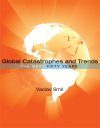![Global Catastrophes and Trends Global Catastrophes and Trends]()
Click to have a closer look
About this book
Customer reviews
Biography
Related titles
About this book
Fundamental change occurs most often in one of two ways: as a "fatal discontinuity," a sudden catastrophic event that is potentially world changing, or as a persistent, gradual trend. Global catastrophes include volcanic eruptions, viral pandemics, wars, and large-scale terrorist attacks; trends are demographic, environmental, economic, and political shifts that unfold over time. In this provocative book, scientist Vaclav Smil takes a wide-ranging, interdisciplinary look at the catastrophes and trends the next fifty years may bring. This is not a book of forecasts or scenarios but one that reminds us to pay attention to, and plan for the consequences of, apparently unpredictable events and the ultimate direction of long-term trends.
Smil first looks at rare but cataclysmic events, both natural and human-produced, then at trends of global importance: the transition from fossil fuels to other energy sources; demographic and political shifts in Europe, Japan, Russia, China, the United States, and the Muslim world; the battle for global primacy; and growing economic and social inequality. He also considers environmental change – in some ways an amalgam of sudden discontinuities and gradual change – and assesses the often misunderstood complexities of global warming. Global Catastrophes and Trends does not come down on the side of either doom-and-gloom scenarios or techno-euphoria. Instead, relying on long-term historical perspectives and a distaste for the rigid compartmentalization of knowledge, Smil argues that understanding change will help us reverse negative trends and minimize the risk of catastrophe.
Customer Reviews
Biography
Vaclav Smil is Distinguished Professor at the University of Manitoba and the author of many books, including Energy in Nature and Society: General Energetics of Complex Systems, Energy at the Crossroads, The Earth's Biosphere: Evolution, Dynamics, and Change, Energies: An Illustrated Guide to the Biosphere and Civilization, all of which are published by The MIT Press. He was awarded the 2007 Olivia Schieffelin Nordberg Award for excellence in writing and editing in the population sciences.




































